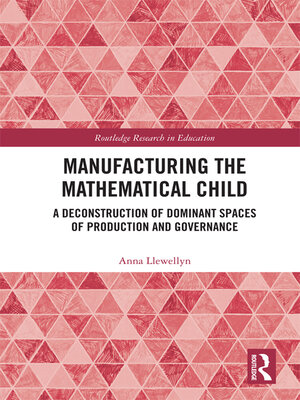Manufacturing the Mathematical Child
ebook ∣ A Deconstruction of Dominant Spaces of Production and Governance · Routledge Research in Education
By Anna Llewellyn

Sign up to save your library
With an OverDrive account, you can save your favorite libraries for at-a-glance information about availability. Find out more about OverDrive accounts.
Find this title in Libby, the library reading app by OverDrive.



Search for a digital library with this title
Title found at these libraries:
| Library Name | Distance |
|---|---|
| Loading... |
Mathematics is a subject held in high esteem around the world, yet the teaching and learning of mathematics is rarely viewed as good enough and many find the subject difficult to comprehend, or engage with. In Manufacturing the Mathematical Child, Anna Llewellyn asks some difficult questions in order to determine why this is the case and to question who it is that we allow to succeed at mathematics, particularly within the context of neoliberalism, where education is a product of the market.
By looking at the various sites of production, Llewellyn examines the ways that key discursive spaces produce very different expectations of what it means to do mathematics and demonstrates that these place various homogenised expectations upon children. Arguing that these are not natural, but instead a reproduction of discursive norms, the book demonstrates why some people fit these standardized ways of being and others do not. Using England as a case study and referring to other international contexts, Llewellyn argues that there is a functionality found within certain educational policy discourses, and a romantic attachment to the natural child found within educational research, neither of which can match what happens in the messy classroom. As a result, it becomes evident that exclusion from mathematics is inevitable for many children.
Original and exciting, this book will be of great interest to academics, researchers and postgraduate students within the fields of mathematics education, childhood studies, policy studies, and Foucauldian or post-structural analysis.







